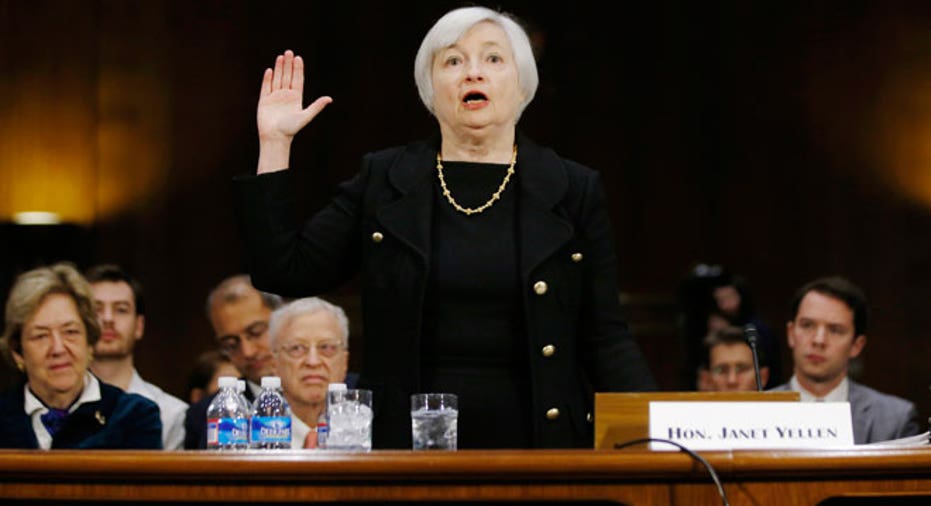Fed Deja Vu? Yellen Doesn't See A Bubble

If a group of Senators, some of them Republicans who have strongly opposed the Federal Reserve’s long-running easy-money policies, didn’t question Janet Yellen’s fitness to run the Fed, I won’t either.
During two hours of testimony last week before the Senate Banking Committee, Yellen’s qualifications to replace current chairman Ben Bernanke when his term ends on Jan. 31 never came up.
What did come up – repeatedly – were questions related to the wisdom of maintaining those aforementioned easy-money policies if the economy doesn’t show significant signs of perking up in the near future.
Yellen’s response was hardly surprising; as Fed chair she will continue, or even boost, the policies introduced under Bernanke – the bond purchases known as quantitative easing and near-zero interest rates – if economic conditions justify such measures.
No breaking news there. Yellen is a monetary policy dove, a key supporter of Bernanke’s unprecedented initiatives since the onset of the 2008 financial crisis.
The only aspect of her answer that surprised me – and many others eyeing the hearings – was Yellen’s conviction that Fed policies aren’t yet contributing to the inflation of asset bubbles, notably in U.S. stock markets.
In response to a direct question from Republican Senator Dean Heller, Yellen acknowledged that stock prices have risen “robustly.” However, fancy measures used by the Fed such as price-to-equity ratios and equity risk premiums indicate that stock prices aren’t “in territory that suggests bubble-like conditions,” according to Yellen.
Huh?
“It’s Crazy”
My immediate thought upon hearing her answer was that Yellen, also a noted academic economist in addition to her career within the Federal Reserve system, hasn’t spoken to anyone on a Wall Street trading desk in a while.
I wasn’t the only person thinking that.
“It’s crazy,” said Mark Williams, a former Fed examiner who now teaches banking at Boston University.
It’s also a little ironic given that part of Yellen’s appeal as the nominee to succeed Bernanke stems from the knowledge that she was one of the first Fed policy makers to voice concerns of a possible housing bubble way back in 2007 and what it could mean to the U.S. economy if that bubble burst.
So it seems a little strange that Yellen, who by nearly all accounts gave an impressive performance during her confirmation hearing, would seemingly dismiss even the possibility that stocks were entering into bubble territory.
In fairness to Yellen, the question she was asked during the hearing was whether U.S. stock markets have reached a level that could be defined as a bubble. She answered that question. Under Fed measurements, she said, there is no bubble.
Implied in the question, of course, was whether Yellen is concerned that such a bubble could burst at any time, causing a major setback to the economic recovery. Her response suggested that she’s not concerned with such a threat.
That should be a concern to the rest of us.
A better question might have been whether Yellen believes Fed policy has been instrumental in fueling the stock market boom, as well as contributing to sharp increases in valuations of other assets including bonds, real estate and even fine art.
Williams, no fan of the Fed’s interventionist policies under Bernanke, said Yellen’s denial of a stock market bubble suggests she is curiously (or dangerously) unaware of “the link between below-market interest rates and their impact on generating bubbles.”
“Cheap money policies allow investors to spend money that perhaps isn’t practical,” he said.
Bad News is Good News
If Yellen needed evidence that Fed policy was feeding the current bull market in stocks, Williams said she need look no further than investor behavior each time the Fed hints that it may start scaling back its $85 billion in monthly bond purchases. Stocks sell off.
Conversely, and even more telling perhaps, is investor behavior on days when gloomy economic data are released. Normally, a lousy jobs or housing report would spur selling. Not recently. In the current investing environment bad news is good news for the stock markets because it means the Fed is less likely to pull the plug on easy money.
The most important question is whether any of this Fed largesse is trickling down to average Americans, or whether it’s merely boosting the profits of too-big-to fail banks.
“How much are we getting for $85 billion a month?” asks Williams.
Yellen makes a convincing argument that average Americans have benefited from the Fed’s radical policies. Quantitative easing and near-zero interest rates have lowered mortgage rates and spurred demand for homes, which has pushed housing prices higher and raised household wealth. And from another perspective the rising stock market has helped rebuild all of those 401k retirement funds obliterated by the economic downturn five years ago.
Both are valid points, but far less quantifiable than the run up in the stock markets and the trickle down affect the bull market has had on Wall Street profits.
Here’s the part I find scary. While common sense suggests that Yellen and her dovish colleagues on the Fed aren’t completely ignoring signs of asset bubbles, especially since some of their hawkish colleagues are loudly making the point, that was precisely the scenario leading up to the financial crisis.
A small minority on the Fed, including Yellen, was warning of a dangerous bubble, but that warning was drowned out by the majority, which included Bernanke, who waved off concerns until it was too late.
Let’s hope we haven’t seen this movie before.



















